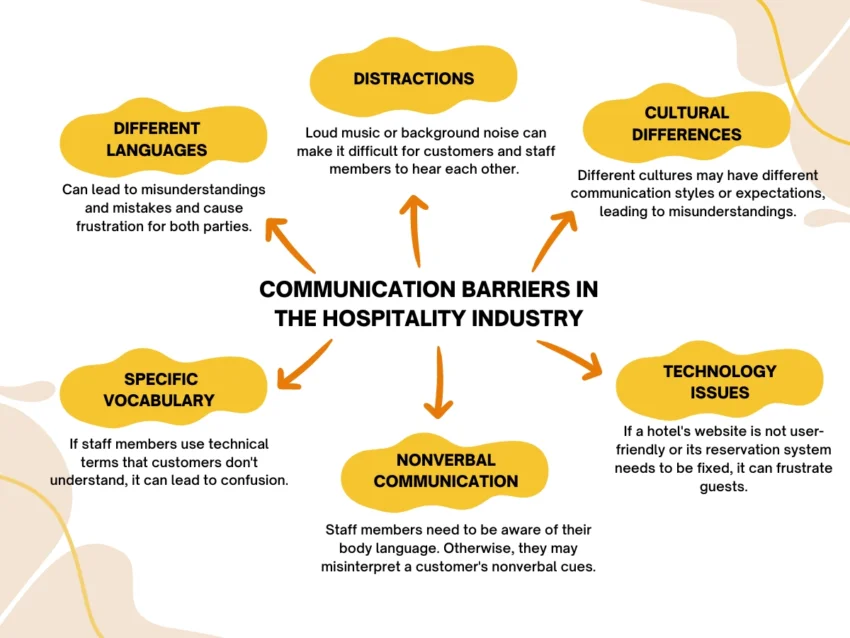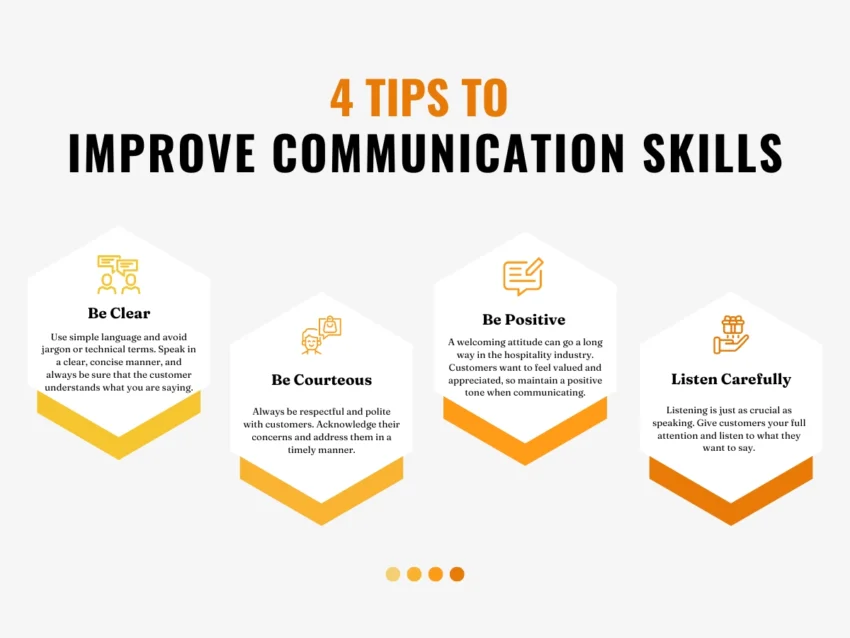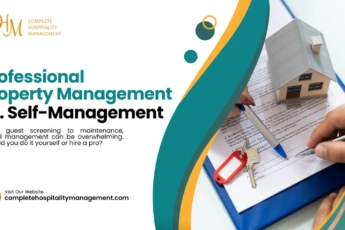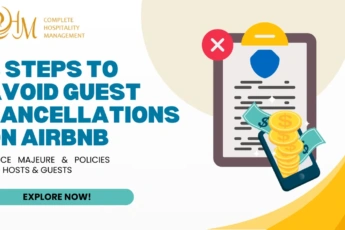Communication in the Hospitality Industry – Importance, Skills & Tips
As a property owner or manager, it’s critical to understand the importance of communication in the hospitality industry. From working with guests to ensuring your team is well-equipped to communicate effectively can mean the difference between a thriving business and one struggling to stay afloat. Strong communication skills are a must for all hospitality workers.
Role of communication in the
hospitality industry
Hotels, resorts, vacation rentals, and travel agencies rely on effective communication to deliver excellent customer service and maintain a positive reputation. Here are some reasons why communication in the hospitality industry is vital.
1. Understand your customer needs
Communication skills help listen to and understand guests’ preferences and complaints. They can provide personalized services, address customer concerns, and create positive customer experiences by listening carefully.
Customer needs and how they help in the hospitality industry
| Communication Skill | How it Helps Understand Customer Needs |
|---|---|
| Active Listening | By actively listening to customers, hospitality staff can better understand their wants and needs and tailor their services accordingly. This can lead to greater customer satisfaction and loyalty. |
| Empathy | Empathetic hospitality staff can put themselves in their customer’s shoes, which helps them anticipate and meet their needs more effectively. |
| Clear Verbal Communication | Ensuring customers understand what services are available and how to utilize them best is essential. It also helps customers feel comfortable and at ease with the hospitality staff. |
| Nonverbal Communication | It helps read customers’ emotions and respond appropriately. This can be especially important when verbal communication is limited (e.g., if the customer does not speak the same language as the staff). |
| Conflict Resolution | By remaining calm, empathetic, and professional, hospitality staff can help diffuse tense situations and find solutions that meet everyone’s needs. |
Imagine if a guest requests a particular type of pillow or a specific dish. High communication skills enable to listen to the request, get it right, and do in the best possible way. So that hospitality professionals can create a memorable guest experience, leading to positive reviews.
2. Build rapport with guests
Communication helps here a lot. It is essential for creating a welcoming and hospitable environment. Here is a list of effective tools for building rapport with guests:
- Active listening;
- Personalization;
- Consistency;
- Timeliness;
- Anticipation of needs;
- Positive attitude;
- Nonverbal communication;
- Empathy;
- Respect for cultural differences;
- Transparency and honesty;
- Going above and beyond expectations;
- Offering personalized recommendations or suggestions;
- Remembering guest preferences and names;
- Providing a warm welcome and farewell, etc.
For instance, a hotel receptionist who greets guests warmly, engages them in conversation, and asks about their preferences can create a positive first impression throughout the guest’s stay. By building a positive rapport with guests, hospitality workers can encourage guests to return.
3. Conflict resolution with guests
Communication is crucial in that case. By listening to guests’ concerns, expressing empathy, and providing solutions, hospitality staff can turn negative situations into positive ones.
Examples of conflicts and resolutions in the hospitality industry
| Conflict | Possible Resolution |
|---|---|
| A customer is unhappy with their service or accommodations. | Listen attentively to the customers’ complaints and understand their frustration. When mistakes are made, apologize and provide a fix that explicitly addresses the customer’s issue (e.g., a refund, a room upgrade, a free meal, etc.). Find a solution that satisfies customers’ needs and make them feel heard. |
| Two customers conflict with each other. | Carefully listen to each guest’s problems. You may need to speak with each consumer separately. The aim is to ease the tension and arrive at a just and acceptable solution that benefits all parties. |
| A staff member conflicts with a customer. | The customer’s concerns should be listened to. If a staff member is at fault, they should accept responsibility and extend an apology. Try to demonstrate to the client that their issues are being considered seriously and that actions are being taken to resolve them. |
| A staff member conflicts with another staff member. | Understand each other’s concerns and work to find a solution that addresses the issue. Management may need to get involved to mediate the conflict. Find a fair and reasonable resolution for all parties involved that helps maintain a positive work environment. |
Suppose a guest complains about a noisy room. In that situation, the hotel staff should listen to the guest’s concerns, express empathy, and provide a solution, such as moving the guest to a quieter room. This approach will help raise the reputation and level of professionalism in the eyes of the guests.
4. Cross-cultural communication in hospitality
The hospitality industry attracts guests from different parts of the world. By understanding cultural differences, using appropriate language, and respecting other cultures, hospitality professionals can create a positive guest experience that transcends cultural barriers.
Five essential elements of cross-cultural communication in hospitality
| Element | Importance |
|---|---|
| Language | Vital for effective communication and guest satisfaction; helps staff provide a more personalized and welcoming experience. |
| Customs and etiquette | Helps staff avoid misunderstandings and create a positive impression on guests; helps ensure that visitors are treated respectfully and inclusively. |
| Nonverbal communication | Conveys a lot of information in cross-cultural interactions; understanding differences can help staff communicate more effectively and avoid offending. |
| Values and beliefs | Contributes to a respectful and inclusive guest experience by assisting employees in understanding guests’ requirements and preferences. |
| Communication style | Tailoring communication style to the guest’s needs and preferences can lead to a more positive experience; contributes to effective communication and guest satisfaction. |
The role of communication today is so great, it is everywhere, and no business is possible without it. Whatever you do, wherever you go, proper communication will solve half of your problem. However, some barriers may occur.
5. Provide clear instructions to clients
All your policies, procedures, and services are important for your guests. It is a way of effective communication in the hospitality industry that helps to reduce the likelihood of confusion or misunderstandings. Here are the most needed ones:
- Check-in and Check-out Procedures;
- House Rules;
- Property Information;
- Emergency Procedures;
- Wi-Fi and Internet Access;
- User Manuals (TV, AC, kitchen appliances, etc.);
- Tourist Information;
- Feedback Form.
Transparent instructions, helpful information about local attractions and dining options, and assistance with transportation can ensure guests have a smooth and stress-free stay. It can significantly result in positive reviews and word-of-mouth recommendations, benefiting reputation and business success.
6. Teamwork in the hospitality industry
Any businesses often require working in teams, and communication skills are essential for effective collaboration. Clear dialogues between team members can improve efficiency, reduce errors, and ensure that tasks are completed on time. Here are some other reasons why teamwork is vital in the hospitality industry:
- Better customer service. Guests are pleased when employees work together to deliver a more effective and efficient service.
- Improved efficiency. Working together, staff can split responsibilities, coordinate efforts, and streamline procedures, improving operations.
- Enhanced employee morale. Employees who feel like they are part of a team tend to be more motivated, engaged, and committed to their work.
- Increased productivity. Teamwork allows staff to focus on their strengths and delegate tasks to others with the skills to complete them.
- Adaptability. Employees working together as a team can adapt to changing circumstances and handle challenges more effectively.
- Cross-training opportunities. New skills and experience in different business areas can make personnel more versatile and valuable.
- Positive company culture. Open communication, mutual respect, and a shared sense of purpose lead to higher staff satisfaction and a more cohesive workplace.
For instance, a hotel has a large event that requires coordination between multiple departments. In that case, communication skills help the team members to speak effectively, ensure everything runs smoothly, and create a positive guest experience. It leads to excellent reviews and repeats business.
7. Marketing and promotion in hospitality
We use various communication channels, and here are the most used ones. But note all the dependent variables associated with each method can vary depending on various factors, such as the size of the business, target audience, and competition level in the market.
Comparison of effective marketing and promotion strategies for the hospitality industry
| Marketing and Promotion Method | Level of Difficulty | Time Frame for Results | Level of Cost |
|---|---|---|---|
| Social Media Marketing | Easy | Short-term (1-3 months) | Low |
| Email Marketing | Moderate | Short-term (1-3 months) | Low |
| Influencer Marketing | Moderate | Medium-term (3-6 months) | Medium |
| Search Engine Optimization | Difficult | Medium-term (6-12 months) | High |
| Content Marketing | Difficult | Long-term (12+ months) | Medium |
| Pay-Per-Click Advertising | Difficult | Short-term (1-3 months) | High |
| Public Relations | Moderate | Medium-term (3-6 months) | Medium |
Would you like your accommodation to be booked months in advance? Our team manages 35+ OTA channels and creates all the possible marketing campaigns on social media and websites, so we are ready to make your property profitable. Just click here to familiarize yourself and book a consultation!
Communication barriers in
the hospitality industry
The hospitality industry is a customer-centric business that relies heavily on effective communication to ensure customer satisfaction. Communication barriers in this industry can lead to misunderstandings, mistakes, and unhappy customers.

Six Communication Barriers in the Hospitality Industry
To overcome these communication barriers, be aware of these potential issues. Provide translation services, train your staff on cultural differences, simplify technical language, be aware of nonverbal cues, reduce distractions, and ensure that technology is user-friendly.
Tips to improve
communication skills
To ensure customers have a positive experience with hospitality workers, it’s important to equip them with the necessary skills in communication in the hospitality industry. We strongly recommend you be courteous, cheerful, and clear. Listen to your clients: it’s a crucial way to fulfill their desires and requirements.

Four Tips to Improve Communication Skills
Training and development of
communication skills
Developing and enhancing communication skills is possible. You must invest in it. Customer service, dispute resolution, and communication skills should all be learned.
Plan for developing communication skills in the hospitality industry
| Steps | Description | Books to Read |
|---|---|---|
| 1. Assess current skills | Conduct a communication skills assessment in the company. It can be done through surveys, interviews, or focus group discussions. |
1. “Crucial Conversations: Tools for Talking When Stakes Are High” by Kerry Patterson, Joseph Grenny, Ron McMillan, and Al Switzler 2. “Communicating for Results: A Guide for Business and the Professions” by Cheryl Hamilton |
| 2. Identify skills training needs | This step can include active listening, conflict resolution, verbal and written communication, customer service, and teamwork. |
1. “The Communication Skills Workbook: Self-Assessments, Exercises & Educational Handouts” by Judith Belmont and Lora Shor 2. “Effective Communication Skills” by Steve Shipside |
| 3. Develop training materials | Resources for it should cover the identified training needs. For instance, e-learning modules, video tutorials, case studies, and role-playing scenarios. |
1. “Communication Skills Training” by Rebecca L. Keating 2. “The Manager’s Guide to Effective Meetings” by Barbara J. Streibel |
| 4. Deliver training | You can use various methods, such as workshops, seminars, and online training sessions. Ensure the training is interactive, practical, and relevant to the industry. |
1. “Training in Interpersonal Skills: TIPS for Managing People at Work” by Stephen P. Robbins, Phillip L. Hunsaker, and Timothy A. Judge 2. “Verbal Judo: The Gentle Art of Persuasion” by George J. Thompson and Jerry B. Jenkins |
| 5. Provide coaching and feedback | Do this through regular performance evaluations, role-playing exercises, and ongoing training. |
1. “Coaching for Performance: GROWing Human Potential and Purpose” by John Whitmore 2. “Difficult Conversations: How to Discuss What Matters Most” by Douglas Stone, Bruce Patton, and Sheila Heen |
| 6. Reinforce learning | Provide ongoing opportunities for practice. This can be achieved by assigning specific communication-related tasks, encouraging participation in team meetings, and providing feedback on communication performance. |
1. “Crucial Accountability: Tools for Resolving Violated Expectations, Broken Commitments, and Bad Behavior” by Kerry Patterson, Joseph Grenny, Ron McMillan, and Al Switzler 2. “The Power of Positive Leadership: How and Why Positive Leaders Transform Teams and Organizations and Change the World” by Jon Gordon |
| 7. Evaluate effectiveness | It can be done through surveys, focus group discussions, and performance evaluations. Use the feedback to improve the training program continuously. |
1. “Assessing and Improving Your Communication Skills” by Chris Roebuck 2. “How to Win Friends and Influence People” by Dale Carnegie |
If you want to approach this subject independently, consider earning a BBA & MBA in Hospitality Management. Your studying will take about five years and a huge amount of money. But if you want to get the most essential knowledge and skills in communication in the hospitality industry quickly and from experts with 10+ years of experience, you should pay attention to our hospitality consulting services.
Effective communication on online OTA-platforms
like Airbnb, Booking, VRBO
High-quality communication in the hospitality industry on online platforms is essential. As Airbnb host, you are responsible for providing accurate information about your listing, responding promptly to guest requests, and addressing any issues or concerns that may arise. Here are three main points why communication with Airbnb guests is essential.
1. Build trust and credibility
By providing clear and accurate information about your listing, promptly answering guest inquiries, and addressing any issues, you can ensure your guests have a comfortable and enjoyable stay.
Using communication, you can personalize the guests’ experience. Consider providing them with recommendations for local attractions or restaurants, which can enhance the overall experience and Airbnb’s long-term success.
2. Create a positive guest experience
It is vital to prioritize guest satisfaction by providing clean and comfortable accommodations, clear communication, and helpful amenities and services. By doing so, you can build a loyal following of satisfied guests and enjoy a successful hosting experience on Airbnb.
As a bonus, you will probably get repeated bookings, excellent reviews, and a sense of fulfillment as an Airbnb host.
4. Ensure a smooth and stress-free stay
Clear instructions for check-in and check-out, addressing any issues or concerns that may arise promptly, and communicating any changes or updates to the guest’s stay significantly affect this point. This can help avoid misunderstandings during the guest’s stay, leading to negative reviews and affecting your reputation on Airbnb.
If you are looking for professionals with experience in co-hosting, we can offer you our services! We already have a complete team that can and knows everything about hospitality management literally. Look at what you can get with our team, and write to us!
The conclusion
The importance of communication in the hospitality industry is enormous. You should prioritize communication with your guests, provide clear and accurate information, respond promptly to inquiries and requests, and address any issues or concerns that may arise during your guest’s stay. This all can contribute significantly to the long-term success of your property rental business.
Frequently asked questions about
communication in hospitality
1. What is the role of communication in the hospitality industry?
Effective communication is crucial for developing client relationships, fostering a good experience, and providing top-notch service in the hospitality business because it is a service-oriented sector of the economy.
2. What are the communication tools used in the hospitality industry?
The hospitality industry uses a variety of communication tools. Phone systems, email, social networking, messaging apps, digital signage, and in-room technology are a few of the most popular ones.
The secret is to select the best tools for your business and use them to develop close bonds with your customers.
3. What is two-way communication in hospitality industry?
Two-way communication describes the process of information exchange between the service provider and the customer or visitor. Both parties actively participate in the exchange of ideas, information, and feedback in two-way communication. Here are several examples:
- Guest feedback. A guest at a hotel may provide feedback on their experience so that the staff can use it to improve their offerings. The hotel can then reply to the visitor’s comments to show that it is taking the visitor’s complaints seriously.
- Consumer service. When clients ask for services or assistance, the hotel staff must act immediately and engage them in conversation to understand their needs and preferences. This simplifies guaranteeing that the service meets the client’s requirements.
- Conflicts. Quick and equitable resolution of the issue can be facilitated through two-way communication. In order to do this, both sides of the argument must be actively listening to, and a compromise must be reached that is acceptable to all parties.
- Marketing and sales. This entails comprehending the demands and preferences of the customer and adjusting sales messages accordingly. To enhance marketing initiatives and draw in more clients, it also entails paying attention to customer feedback.
4. What is communication skill in the hotel industry?
The capacity to successfully communicate information to clients and coworkers in a clear, succinct, and professional manner is referred to in the hotel industry as communication skills. To develop relationships with customers, provide superior service, and guarantee efficient operations, hotel staff members must have outstanding communication skills.
The abilities to listen actively, communicate clearly, empathize, speak many languages, and resolve conflicts are among the most crucial.
5. How will you communicate with customers in hotel?
To provide outstanding service and forge lasting relationships with clients, adopting efficient communication techniques when speaking with them in a hotel is crucial. These are some tips for interacting with guests:
- warmly welcome visitors;
- use the visitor’s name;
- listen intently;
- use simple language;
- be empathic;
- provide accurate information;
- use positive words;
- be courteous.
Following these recommendations may give the visitor a satisfying experience and develop a solid rapport with them.
6. How do hotels communicate with customers?
Hotels employ a range of communication channels to engage with guests and deliver top-notch service. Contact forms are in-person, via phone, email, messaging apps, social media, in-room communication technologies, and mobile apps.
Updated on: . Author:






